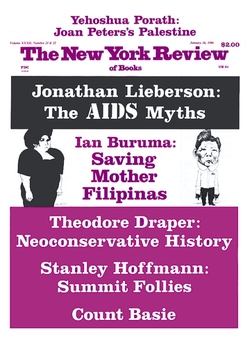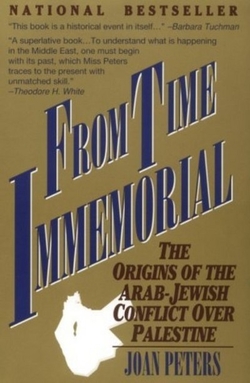 Joan Peters's From Time Immemorial has, broadly speaking, been received in two ways at two times. Early reviews treated her book as a serious contribution to the study of the Arab-Israeli conflict and late ones dismissed it as propaganda. Coming almost two years after the book's publication, Professor Yehoshua Porath's review in your January 16, 1986, issue probably closes the second round. As one of those who reviewed the book when it first appeared—and who was referred to for this reason in Professor Porath's review—I should at this time like to comment on the debate.
Joan Peters's From Time Immemorial has, broadly speaking, been received in two ways at two times. Early reviews treated her book as a serious contribution to the study of the Arab-Israeli conflict and late ones dismissed it as propaganda. Coming almost two years after the book's publication, Professor Yehoshua Porath's review in your January 16, 1986, issue probably closes the second round. As one of those who reviewed the book when it first appeared—and who was referred to for this reason in Professor Porath's review—I should at this time like to comment on the debate.
The difference between the two rounds is not hard to explain. Most early reviewers, including myself, focused on the substance of Miss Peters's central thesis; the later reviewers, in contrast, emphasized the faults—technical, historical, and literary—in Miss Peters's book.
I would not dispute the existence of those faults. From Time Immemorial quotes carelessly, uses statistics sloppily, and ignores inconvenient facts. Much of the book is irrelevant to Miss Peters's central thesis. The author's linguistic and scholarly abilities are open to question. Excessive use of quotation marks, eccentric footnotes, and a polemical, somewhat hysterical undertone mar the book. In short, From Time Immemorial stands out as an appallingly crafted book.
Granting all this, the fact remains that the book presents a thesis that neither Professor Porath nor any other reviewer has so far succeeded in refuting. Miss Peters's central thesis is that a substantial immigration of Arabs to Palestine took place during the first half of the twentieth century. She supports this argument with an array of demographic statistics and contemporary accounts, the bulk of which have not been questioned by any reviewer, including Professor Porath.
Nonetheless, Professor Porath dismisses her argument as "fanciful." He says that "the main reason" for Arab population growth is that Arab births remained steady while infant mortality decreased. He concludes that the movement of population was not significant in comparison with natural increase.
Now, there can be no question that improvements in medical conditions contributed to the increase in Arab population. But it is not immediately clear that declining infant mortality was more important than immigration. Professor Porath asserts this but he does not provide the evidence necessary to convince a reader.
 Joan Peters, "From Time Immemorial". |
Faulty presentation notwithstanding, Miss Peters's hypothesis is on the table; it is incumbent on her critics to cease the name-calling and make a serious effort to show her wrong by demonstrating that many thousands of Arabs did not emigrate to Palestine in the period under question.
Until such happens, what is one to think? Is there reason to accept Miss Peters's version of events? I believe so: even though From Time Immemorial does not place Arab immigration to Palestine in a historical context, it is not hard to find a rationale for their movement. The Arabs who went to Palestine sought economic opportunity created by the Zionists. As Europeans, the Zionists brought with them to Palestine resources and skills far in advance of anything possessed by the local population. Jews initiated advanced economic activities that created jobs and wealth and drew Arabs. Zionists resembled the British, Germans, and other Europeans of modern times who settled in sparsely populated areas—Australia, southern Africa, or the American West—and then attracted the indigenous people to themselves.
There is really nothing surprising in all this; and because it makes such good sense, I put credence in the argument that substantial numbers of Arabs moved to Palestine. I will adjust my views, of course, should compelling evidence be found to show otherwise. But this will require that Miss Peters's critics go beyond polemics and actually prove her thesis wrong.
Daniel Pipes
Naval War College
Newport, Rhode Island
Apr. 8, 1988 update: The following review of Yehoshua Porath's role in the controversy over From Time Immemorial was written for a mailing from the Foreign Policy Research Institute:
In 1984 Joan Peters provoked a peculiar controversy when she published From Time Immemorial, a study of Arab-Israel relations. The debate centered about the author's contention that most Palestinians were not living in Palestine for centuries but immigrated to the region in the first half of the twentieth century. Reactions were sharply polarized. Those who sympathize with Israel welcomed Miss Peters' study as a major contribution to the understanding of the Arab-Israeli conflict; those sympathetic to the Arabs rejected her efforts as biased and fraudulent. Although some pro-Israeli reviewers expressed reservations about the book on academic grounds, no American reviewer crossed these lines.But then, in a long review, "Mrs. Peters's Palestine," in The New York Review of Books, an Israeli historian, Yehoshua Porath, damned the book. As the first prominent Israeli to participate in this debate, his opinions carried exceptional weight. His review gave ammunition to anti-Israel elements; if an Israeli damned the book, surely the pro-Peters position had been undercut.But the Porath review fits a context. He sees the Peters work in the Likud historiographic tradition and takes her to task for accepting and extending the Likud version of Palestinian history. In a word, Porath is debating Peters in the context of Israeli politics, of Labor vs. Likud, and not in the American context of anti-Israel vs. pro-Israel. His review would be understood in this way if it appeared in Hebrew in Israel, but it has a vastly different impact when published in English in New York.